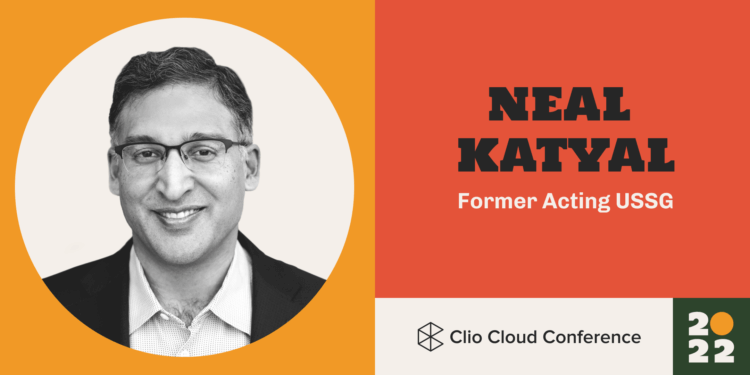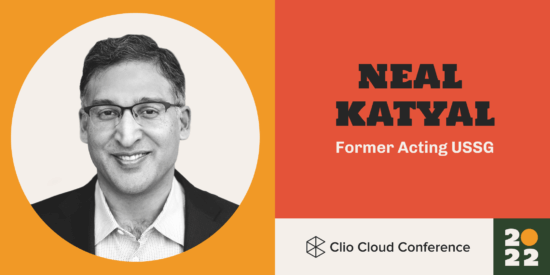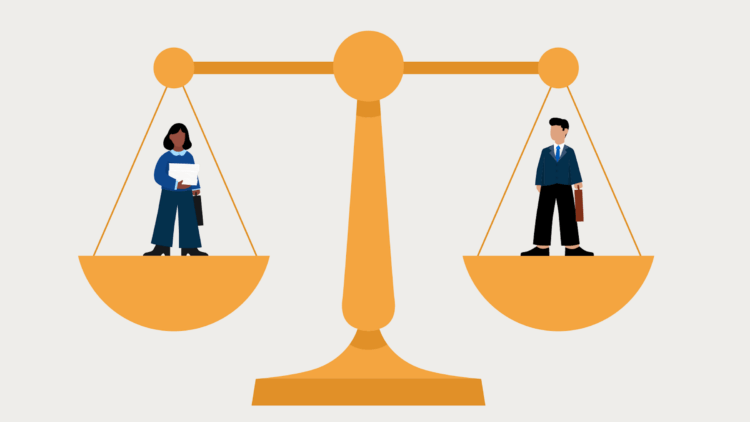An oral argument is just one part of an overall lawyer argument and the overall trial process. But it’s one that gets the most attention, especially when that argument takes place before the US Supreme Court.
No one knows this better than Neal Katyal. A prolific litigator and former Solicitor General of the United States, Neal has argued 47 cases before the US Supreme Court, a record in US history for a minority attorney. Neal gave an impactful keynote at the 2022 Clio Cloud Conference, and we’re lucky enough to share some of his experiences below.
For Neal, one of the main ways lawyers can improve their arguments is to focus on clients. “Unfortunately there are a lot of lawyers who are lawyer-centered and not client-centered,” he said.
Below are more tips on how to deliver legal arguments persuasively, from our conversation with Neal.
1. Think about client impact
One of the most important parts of any case is the human element. At the end of the day, there are both practical and emotional impacts for any argument and its outcome. “This is true in every case. Even in a corporate case,” said Neal.
Taking a client-centered approach to lawyering will help you to build stronger arguments as you keep what the case truly means to your client top-of-mind.
2. Remember that clients are interacting with the law all the time, whether they know it or not
In the book The Client-Centered Law Firm, Jack Newton talks about the client journey, and how it starts when a client starts looking for a lawyer. However, for Neal, the client journey starts even earlier—because clients are interacting with the law constantly in their daily lives.
“As lawyers think about how to do advocacy, I think the most important thing is to remember that the law is a human endeavor, and so any law has human consequences,” said Neal. “So before any argument I’m always trying to ask the people who it affects for more detail.
For example, for a case involving banking law, Neal would speak to bankers and ask, once they’ve received a cashier’s check, what do you do with it? What laws do you follow?
“I trace them through their daily life in the shadow of the law, and that helps me understand what the case is about—and ultimately, hopefully, helps me be more persuasive to the court because I understand how the law is working in practice.”
You may like these posts
3. Listen to what those around you know about the legal argument
Neal is constantly flipping from one field of law to the next as he’s brought into various cases to argue when the case reaches the Supreme Court. How does he succeed? By getting input from people who’ve been on the case for longer, and not letting ego get in the way.
“They may have not gone to a fancy law school or argued as many cases as me, but you know what? They know a lot more about the case than I do, so I better learn from them,” Neal explained.
This was an especially important point when Neal was lead counsel in the Supreme Court case Hamdan v. Rumsfeld, representing Salim Ahmed Hamdan, a man who had worked as a driver for Osama bin Laden. Eventually, as a law professor, Neal was able to secure the support of a law firm on the case.
But for the first two years of the case, he worked on it with about 100 of his law school students.
“Now, they’re students. They’re going to give you a bunch of stuff that’s not very good,” he said. “But that experience taught me that if you could aggregate all these inputs from all these people you can create a very strong product.”
4. Lawyer arguments should be a conversation—not a speech
For Neal, one of the biggest issues with oral arguments today is that they can be less of a conversation and more of a speech, leaving judges frustrated.
“If you’re a lawyer who comes in to argue your case and you’re so 100% sure you’re right, you’re likely to not be very persuasive,” he said.
If you’ve written your brief well, Neal explains, that should be your speech. Oral argument, which comes only after a written submission, should be the place where you address the judge’s concerns and treat it more like a conversation.
“You should be trying to understand ‘what is it, judge, that’s bothering you about our case?’ And try to address the case from their perspective, not as much yours,” he said.
5. Lead with empathy
Neal often says that “confidence is the enemy of persuasion,” and advises that empathy is more important. Empathy helps you see the other side, address things from their perspective, and ultimately reach your goal—rather than forcibly proving a point.
In the law school environment, he sees young students get more argumentative not just when it comes to the law, but with their spouses, their friends and family, and others in their lives. “It’s totally the wrong way to lawyer, and the wrong way to live your life,” he said.
What will help change the future of the legal industry? Speaking of the Clio Cloud Conference, Neal said one solution is “conferences like this where people talk about this and raise these concerns.”
“When people say ‘you won’t be as good of a lawyer if you’re empathetic. You should just be confident,’ I think that’s the wrong way to be. We can do better.” Neal added.
6. Prepare for oral arguments your way
47 Supreme Court Cases and counting later, Neal still prepares to argue cases the same way:
- He wears a bracelet from his father.
- He puts on a tie his mother picked out.
- He writes his children’s names on a legal pad to ground himself.
And, he talks to his children the night before a case. He started when they were two, four, and six. Now, even though they’re 17, 19, and 21, he still speaks to at least one of them. The questions are better now, of course, but he still has to boil the case down and explain it, which helps with clarity.
Neal also strategizes with his children about what to do if he gets nervous. Their suggestions always work, even if the suggestion is “think about sheep.”
Even today, Neal remembers how amazing it felt the first time he won a Supreme Court case. And he believes more strongly than ever in the importance of the American Legal system and in arguing well.
“It was something about, for me, the power of the American legal system that some 35 year old law professor could challenge the president and win. It’s quite an amazing thing,” he said.
What’s even better than reading inspiring advice from Neal Katyal? Being in the live audience at next year’s Clio Cloud Conference keynote presentations.
Don’t miss out: Snag your ClioCon ticket now—before they sell out.
What do I say when quitting a law firm?
It’s vital you remain professional and polite when quitting a law firm. Express your appreciation for the opportunities the firm has provided you and thank your colleagues for their support. Wish them the best in their future endeavors. Don’t burn bridges as this could harm your reputation.
What happens when a law partner leaves a firm?
When a law partner leaves a firm, they will likely take clients with them, negatively impacting the firm’s bottom line. The firm will need to hire a replacement to fill the gap, as well as potentially restructuring their practice areas and reorganizing their teams.
Why do people leave law firms?
People leave law firms for many reasons, including a lack of job satisfaction, difficulty finding work-life balance, and a desire to explore other career opportunities. Some people may also leave for career advancement opportunities or because they want to work for a different type of law firm.
What to do before quitting a law firm?
Before quitting a law firm, you must submit your notice and complete any work assigned to you. Make sure you let both your clients and colleagues know as soon as possible—this will help them plan accordingly. Additionally, remember to return all documents and equipment that belongs to the firm.
We published this blog post in November 2022. Last updated: .
Categorized in: Business









